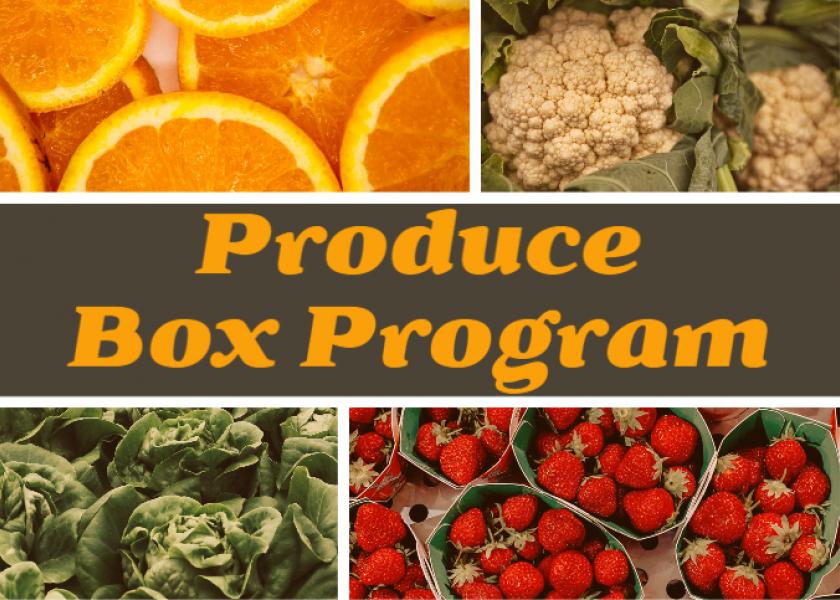CORRECTED: USDA revamps food box selection process

(CORRECTED) As anticipated, the U.S. Department of Agriculture is releasing a third round of contracts for the Farmers to Families Food Box Program, to spend the full $3 billion approved for the program.
The USDA, however, is emphasizing changes in soliciting and awarding the $500 million to $700 million in contracts, based on input from food banks. There is no deadline to apply.
Hillary Cole, Agricultural Marketing Service contracting officer for the program, said in a July 28 web seminar (https://bit.ly/2CUvghC) that supporting growers is still important, but “distributing boxes to food insecure populations has really become of paramount importance in this solicitation.”
For this reason, all distributors in the third round must apply to participate. In the second round, most contracts were extensions of first-round approvals.
In order to ensure new rules will be followed, the USDA has a two-step process, with distributors filing a Basic Ordering Agreement (BOA). The USDA will review the BOA, and if more information or clarifications are needed, applicants can fill in the blanks and resubmit. In the first round, a number of companies said they were passed over for minor paperwork errors, and did not receive a chance to resubmit.
Companies must have a “truck to trunk” model, meaning that food banks won’t be shouldering extra expenses for providing refrigerated storage or transportation to distribution sites in other cities, basically making sure contract recipients are responsible for “last mile delivery,” Cole said.
New contracts must be combination boxes, meaning they must contain fresh produce, dairy products and meat (and eggs, if the distributor chooses). The USDA will allow for the products to be boxed separately because of temperature-sensitive items. Altogether, the items for each box should weigh 30-40 pounds. Previous awards did not specify box weights.
Participants must work with the nonprofits they plan to partner with, including documenting delivery schedules, and inform the USDA of subcontractors they will use. Perishable Agricultural Commodity Act licenses are required — several first-round contracts, including two for a total of $79 million, went to companies without PACA licenses.
The USDA is also asking for three references from the agencies they worked with since the food box program began May 15, and sample prices to ensure prices are reasonable.
The second step of the process is when the USDA selects BOA holders to supply specific regions of the country, a step to ensure all regions needs are covered. In a July 21 House Agriculture subcommittee hearing, several representatives called out uneven distribution of funds through the program.
According to Rep. Jim McGovern, D-Mass., New England nonprofits received only about 4% of the overall dollars spent on the program at that time.
See https://bit.ly/33cLTQm for more information on the USDA’s solicitation.
Overview of program
Although the USDA announced contracts worth $1.22 billion (May 15-June 30) and $1.47 billion (July 1-Aug. 31) in the first two rounds, leaving around $300 million for the third round, the USDA revised funds spent during the first round.
Instead of $1.22 billion, companies spent around $947 million, according to the July 24 USDA notice of the new contracts. That accounts for one contract the USDA cancelled, another one that the company declined and for companies that did not fulfill their entire contract and had to remit the funds.
At the July 21 hearing, USDA Under Secretary Greg Ibach said the last round of contracts, which extend the program through October, will be worth $500 million to $700 million.
The United Fresh Produce Association and Produce Marketing Association cited those numbers in separate member alerts on the new contracts on July 24.
“PMA worked closely with USDA/(Agricultural Marketing Service) to recommend improvements in the future rounds of solicitations, and is appreciative of the collaboration and look forward to an improved experience for the industry,” Richard Owen, vice president of membership and engagement at PMA, said in the e-mail.
Note on correction: The story originally included a deadline for application. There is no deadline for applying.
Related stories:
Webinars, boxes and a party: what’s happening during pandemic
A day at the food bank to see USDA’s Farmers to Families Boxes







